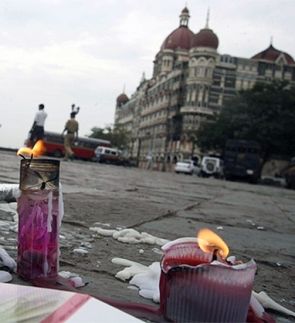 The terror strike on Mumbai, carried out by ten suicidal terrorists and planned by Pakistani terror group Lashkar-e-Tayiba, had cost less than Rs 25 lakh.
The terror strike on Mumbai, carried out by ten suicidal terrorists and planned by Pakistani terror group Lashkar-e-Tayiba, had cost less than Rs 25 lakh.
This claim is made in the book The Siege, a narrative about the worst terror strike on India, by Adrian Levy and Cathy Scott.
But the National Investigation Agency, which was set up in the wake of the attack on November 26, 2008, is not ready to accept this figure.
An official of the NIA argues that the terrorists and their handlers would have had to cough up no less than Rs 25 lakh for the various reconnaissance trips undertaken by Lashkar terrorists in the run-up the actual strike.
Incarcerated LeT operative David Headley, who played a crucial role in planning the terror strike, has earlier revealed that Rs 25 lakh was given to the Lashkar leadership by Pakistani spy agency Inter Services Intelligence to cover the cost of travel of its operatives.
Nearly 30 people are believed to have worked to fine-tune the terror plan at various points. Apart from the hefty payments made to the ten terrorists who attacked Mumbai, a considerable amount of money was spent in the procurement of arms and ammunition and shelling out fees to other operatives.
Headley and the ten terrorists got the biggest piece of the terror fund pie.
While the Pakistani-American double agent was handsomely reimbursed for his frequent trips to India, each of the ten terrorists was promised Rs 10 lakh for the murderous rampage. They were assured that the money would be handed over to their family members on the completion of the attack.
But top operatives of the Lashkar like Abu Jundal, who worked as handlers during the terror strike, were paid a measly sum of Rs 5,000 per month.
Indian investigators estimate that the 26/11 terror strike would have cost anywhere between Rs 2 crore and Rs 2.5 crore.
Lashkar is known for sparing no expense while undertaking major terror missions.
Investigations have revealed that the outfit had spent Rs 50 lakh on the attack on the Indian Institute of Science in Bangalore in 2005.
The terror outfit is funded on the sly by the ISI and, ironically, openly by the Pakistan government.
In 2013, the government of Pakistan’s Punjab province had allotted Rs 61.35 million for the Jamaat-ud-Dawa, widely believed to be a front for the Lashkar. The generous government of Punjab also granted an additional Rs 350 million to the JuD to set up an ambitious ‘knowledge park’.
The NIA official pointed out that terror outfits often use bogus charity organisations as a proxy method to raise funds.
While probing the activities of the Hizbul Mujahideen, security agencies found that the terror outfit banked heavily on funds raised by a charity organisation, to carry out terror strikes in Kashmir.
The Hizbul had raised nearly Rs 13 crore through donations made to the Jammu and Kashmir Affectees Relief Trust. The money was subsequently distributed among Hizbul leaders and other terror groups via hawala networks and spurious bank accounts.
Image: Candles placed in the memory of 26/11 victims near Taj Mahal Hotel, one of the sites of the attack, in Mumbai ' Photograph: Reuters










